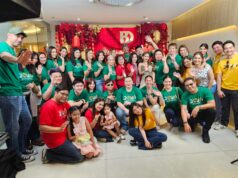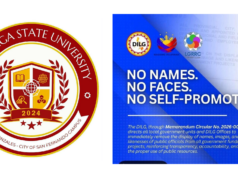SUBIC BAY FREEPORT — Subic Bay Metropolitan Authority (SBMA) Administrator and CEO Armand Arreza has aptly defined the primary challenge if the prevailing information and technology age as something that allows knowledgeable and effective communicators to “help uplift the poor from poverty by enlightening and empowering them with information.”
In an address read for him by Ms. Knette Fernando, deputy administrator for corporate communications group, at the recently concluded 14th National Press Congress held at the Subic Bay Freeport Zone, Arreza told the congress’ delegates that in their hands are the “means and tools to share and spread information and knowledge that can enrich and enhance people’s minds and spirit” and “enhance the country’s intellectual capital.”
The 14th National Press Congress was organized by the Publishers Association, Inc. (PAPI) in cooperation with SBMA and the National Commission for Culture and the Arts. The event’s theme was “The Challenges of the Information-Driven Age.”
Building the country’ intellectual capital, Arreza said, “is as critical to our growth as enhancing human capital” through formal education, training and on-the-job learning for Filipinos.
Arreza said information is intellectual capital, asset and power combined, and in today’s information and knowledge economy, “information alone can and do make people rich” citing the case of the young entrepreneurs who created Yahoo, Google, YouTube and Face Book who have become billionaires in the 30’s.
He also cited the case of Microsoft’s owner Bill Gates whom Immigration Officers at the Canadian border once accosted to have his luggage and assets thoroughly checked, and who in turn presented a pack of floppy disks of Widows 85 which the state agents promptly returned.
“Little did they (Immigration officers) know that those floppy disks of Windows 85 would make Microsoft rise in the global software industry from being a challenger to becoming the richest and the leader in the industry,” he pointed out.
The obtaining information and knowledge economy, Arreza explained is one that values and trades ideas. “It values people more for their brains or knowledge rather than for their brawn and muscles . . . and it values skills and pays skillful people – especially multi-skilled ones – more than others,” he stressed.
Another distinction of the information and knowledge age, he said is that today’s economy “is not of scarcity but rather of abundance (because) unlike other resources on which people relied in the past – labor, land and capital – which get depleted when used, information and knowledge can be shared and actually grown through application.”
The bigger and more important challenge, Arreza said, is “focusing more on teaching people how to learn, and how to apply and le erage the information you spread to better their lives.
The exciting information and knowledge age, Arreza said offers limitless possibilities not only to the literates who are willing to “learn, relearn and unlearn” but also to those, including publishers, journalists and other communicators, who willing to help and empower others to do the same.
Arreza lauded PAPI for its continuing advocacy campaigns on various fronts and issues ranging from press freedom to the promotion of tourism and SMEs, from responsible media reporting to global warming and climate change awareness.
In an address read for him by Ms. Knette Fernando, deputy administrator for corporate communications group, at the recently concluded 14th National Press Congress held at the Subic Bay Freeport Zone, Arreza told the congress’ delegates that in their hands are the “means and tools to share and spread information and knowledge that can enrich and enhance people’s minds and spirit” and “enhance the country’s intellectual capital.”
The 14th National Press Congress was organized by the Publishers Association, Inc. (PAPI) in cooperation with SBMA and the National Commission for Culture and the Arts. The event’s theme was “The Challenges of the Information-Driven Age.”
Building the country’ intellectual capital, Arreza said, “is as critical to our growth as enhancing human capital” through formal education, training and on-the-job learning for Filipinos.
Arreza said information is intellectual capital, asset and power combined, and in today’s information and knowledge economy, “information alone can and do make people rich” citing the case of the young entrepreneurs who created Yahoo, Google, YouTube and Face Book who have become billionaires in the 30’s.
He also cited the case of Microsoft’s owner Bill Gates whom Immigration Officers at the Canadian border once accosted to have his luggage and assets thoroughly checked, and who in turn presented a pack of floppy disks of Widows 85 which the state agents promptly returned.
“Little did they (Immigration officers) know that those floppy disks of Windows 85 would make Microsoft rise in the global software industry from being a challenger to becoming the richest and the leader in the industry,” he pointed out.
The obtaining information and knowledge economy, Arreza explained is one that values and trades ideas. “It values people more for their brains or knowledge rather than for their brawn and muscles . . . and it values skills and pays skillful people – especially multi-skilled ones – more than others,” he stressed.
Another distinction of the information and knowledge age, he said is that today’s economy “is not of scarcity but rather of abundance (because) unlike other resources on which people relied in the past – labor, land and capital – which get depleted when used, information and knowledge can be shared and actually grown through application.”
The bigger and more important challenge, Arreza said, is “focusing more on teaching people how to learn, and how to apply and le erage the information you spread to better their lives.
The exciting information and knowledge age, Arreza said offers limitless possibilities not only to the literates who are willing to “learn, relearn and unlearn” but also to those, including publishers, journalists and other communicators, who willing to help and empower others to do the same.
Arreza lauded PAPI for its continuing advocacy campaigns on various fronts and issues ranging from press freedom to the promotion of tourism and SMEs, from responsible media reporting to global warming and climate change awareness.




